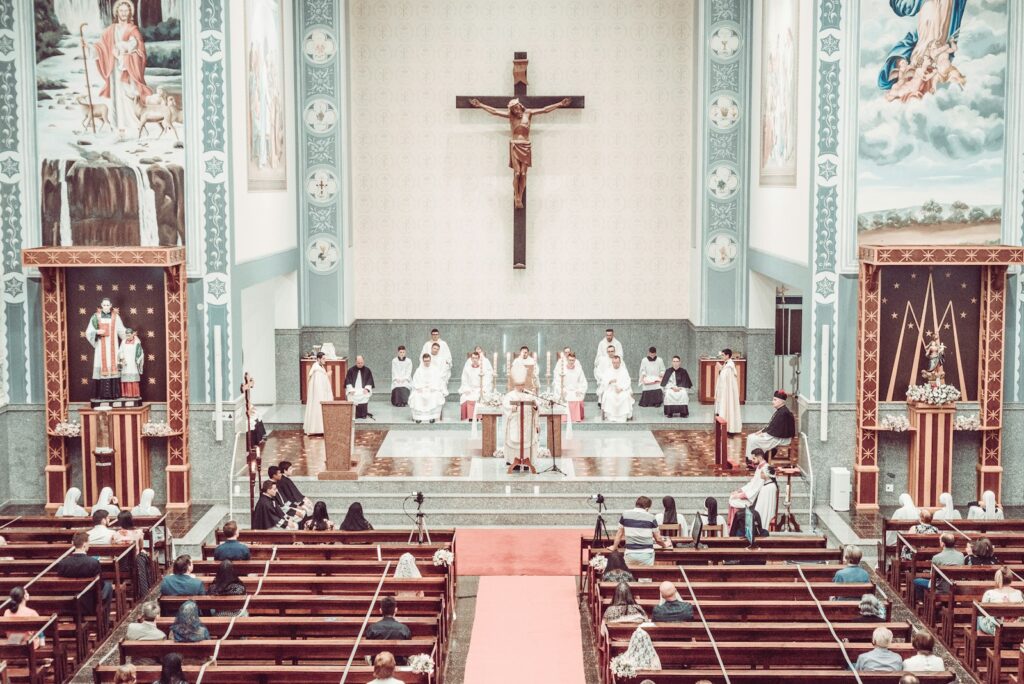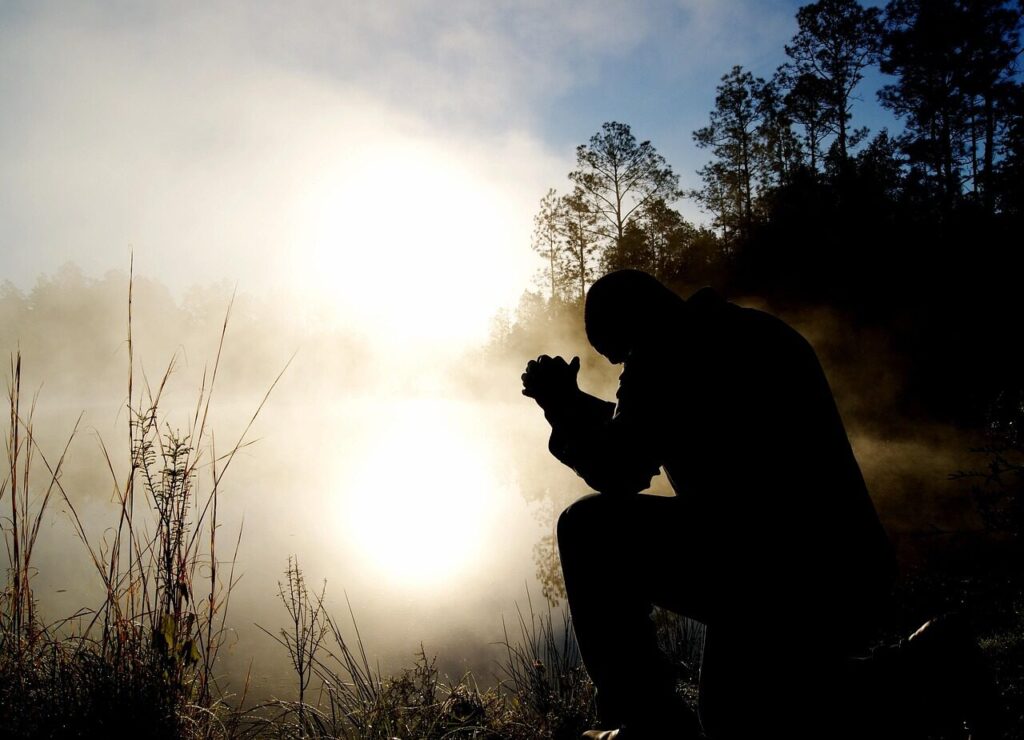Conversations about faith often reveal the deep curiosity that both believers and nonbelievers share about life, purpose, and existence. Atheists, in particular, pose questions not to offend but to understand how people of faith reconcile their beliefs with modern reasoning, science, and human experience. These questions explore morality, free will, suffering, and divine justice, concepts that continue to challenge both sides of the discussion. By reflecting on these ideas, religious individuals can gain insight into how others view their faith, while atheists can better grasp the spiritual motivations behind belief. Here are sixteen thoughtful questions atheists often ask religious people to encourage open dialogue and mutual respect.
1. Why Does God Need Worship If He’s Perfect?

Atheists often wonder why a being believed to be all-powerful and self-sufficient would desire worship or praise. If God is truly complete and unchanging, why would human devotion matter? Religious perspectives suggest that worship is not for God’s benefit but for human growth, an act of gratitude and humility that nurtures spiritual connection. Still, this question invites reflection on whether devotion serves divine expectation or human fulfillment. It challenges believers to think about whether worship is a command or a choice born out of love, rather than obligation or fear of divine disapproval.
2. Why Are Divine Rules Culturally Specific?

Many religions have moral codes, dress requirements, or rituals that reflect local customs and traditions. Atheists often ask why a universal deity would tailor divine instructions to specific cultures or time periods. Religious scholars explain that God’s guidance can manifest differently depending on societal context, ensuring relevance to the people of that era. Yet this raises the question of timeless truth versus cultural adaptation. If God’s nature is unchanging, should his moral expectations remain consistent everywhere? This question invites believers to explore how faith evolves alongside human history while maintaining spiritual integrity and meaning.
3. Why Is Religion Stronger in Less Developed Societies?

Sociologists have observed that religious faith often flourishes in areas experiencing hardship, poverty, or instability. Atheists interpret this as evidence that religion offers comfort amid suffering, rather than proof of divine reality. Believers, however, view faith as a source of resilience and hope that sustains people through difficult times. The question challenges both sides to consider whether religion is a coping mechanism or a genuine spiritual experience. It highlights how faith fills emotional and social needs, providing community, moral guidance, and a sense of control when life feels uncertain or fragile.
4. Why Does God Speak Differently to Different People?

Across religions, divine communication appears in many forms prophets, visions, intuition, or sacred texts, often leading to vastly different beliefs. Atheists question why a single, omnipotent God would deliver conflicting messages, resulting in multiple religions claiming exclusive truth. Believers argue that cultural and linguistic differences shape how people interpret divine experiences. This question probes the limits of human understanding and asks whether spiritual diversity is evidence of confusion or of a greater, multifaceted truth. It also encourages humility, recognizing that personal faith journeys may reveal unique but equally meaningful glimpses of the divine.
5. Why Are Miracles Rare and Hard to Verify Today?

In ancient times, religious texts were filled with miracles, burning bushes, parted seas, and divine healings. Today, skeptics note that such events are scarce and often lack scientific verification. Some believers argue that miracles still happen quietly, often interpreted through personal faith rather than public spectacle. This question challenges the modern believer to consider how faith interacts with evidence. Is belief in miracles dependent on proof, or on trust in experiences beyond empirical explanation? The conversation reveals how technology and rationality have reshaped how humanity perceives the sacred and the mysterious.
6. Why Do People Usually Follow the Religion of Their Birthplace?

Most individuals grow up practicing the religion of their family or culture, rarely questioning its origins. Atheists see this as a sign that belief is more inherited than chosen. Religious people, however, may view this as part of divine providence, believing they were born into their faith for a reason. This question encourages introspection about whether belief stems from genuine conviction or social conditioning. It also promotes understanding that faith journeys are deeply personal, shaped by family, community, and identity, and that spiritual exploration can transcend one’s inherited worldview.
7. Why Is Eternal Punishment Justified for Finite Sins?

The idea of eternal consequences for temporary actions raises deep ethical concerns. Atheists question how a loving and merciful God could impose infinite punishment for finite human mistakes. Religious interpretations vary: some see hell as separation from God, chosen by free will, while others view it symbolically as a moral consequence rather than a literal torment. This question invites believers to reflect on divine justice versus human fairness, exploring whether eternal punishment aligns with compassion or represents a misunderstanding of divine nature.
8. Why Is Faith Valued Over Evidence?

In religion, faith is often celebrated as the highest virtue, even when evidence is limited. Atheists ask why belief without proof should be admirable. Believers might respond that faith allows humans to embrace mysteries beyond scientific comprehension and nurtures trust in something greater. This question encourages dialogue about the balance between reason and spirituality. Is faith a surrender of logic or an expansion of understanding? It highlights how both believers and skeptics search for truth, albeit through different lenses, one grounded in evidence, the other in experience and intuition.
9. Why Are Religious Texts Open to Conflicting Interpretations?

Sacred scriptures often contain poetic language, metaphors, and historical references, making interpretation complex. Atheists argue that this ambiguity undermines divine authorship. Believers counter that the interpretation reflects human limitation, not divine inconsistency. This question explores how context, language, and culture influence meaning. It invites thoughtful reading of scripture as both spiritual and historical, emphasizing dialogue rather than dogma. Through questioning, both sides can appreciate how interpretation shapes belief and how understanding can deepen when approached with humility and openness.
10. Why Doesn’t God Communicate Today as in the Past?

Ancient texts describe direct encounters with God, yet such revelations seem rare today. Atheists wonder if this suggests those stories were mythological. Believers argue that God still speaks through conscience, nature, or scripture, though not always audibly. This question raises the issue of divine silence in a noisy modern world. Perhaps humanity’s distractions make it harder to listen, or perhaps divine communication has evolved into more subtle forms. Reflecting on this encourages both believers and skeptics to consider what “hearing God” means in an age of science and skepticism.
11. Why Do Some Religious People Avoid Tough Questions?

Atheists often notice that certain believers shy away from challenging inquiries about their faith. This can be interpreted as avoidance, though many faithful simply find such questions uncomfortable or difficult to articulate. Religious institutions sometimes encourage acceptance over questioning, seeing doubt as a weakness. However, open discussion strengthens understanding. This question invites believers to approach doubt as an opportunity for deeper reflection rather than a threat to belief. True faith can withstand scrutiny, and honest dialogue helps bridge the gap between skepticism and spirituality.
12. Why Are Women Often Marginalized in Religious Hierarchies?

Across many faith traditions, leadership roles are predominantly male, leading atheists to question whether divine will supports gender inequality. Believers argue that historical and cultural contexts shaped these practices, not necessarily divine intent. Still, this question urges examination of whether religion should evolve toward greater inclusivity. Many modern faith communities are reinterpreting scriptures to empower women, recognizing their equal spiritual worth. This discussion highlights how religion can adapt to uphold both tradition and equality, ensuring faith remains relevant and compassionate in an increasingly progressive world.
13. Why Do Sacred Texts Sometimes Support Violence or Slavery?

Certain passages in religious texts appear to justify war, slavery, or discrimination. Atheists find it difficult to reconcile these with claims of divine goodness. Believers often interpret such texts as reflections of ancient societal norms rather than divine endorsement. This question challenges readers to contextualize scripture, separating moral principles from historical customs. By acknowledging the complexities of ancient writings, believers can focus on the core message of compassion and justice that underlies most faiths, fostering a more humane understanding of spirituality.
14. Why Do Religious People Fear Death If They Believe in Heaven?

If heaven promises eternal peace, atheists wonder why many believers still fear death. Faith teaches hope in the afterlife, yet the natural instinct for survival and attachment to loved ones often overrides spiritual comfort. This question explores the tension between belief and human emotion. It reminds us that fear of death is universal, regardless of faith, and that spirituality often aims to bring peace, not erase fear. Understanding this helps bridge empathy between believers and nonbelievers alike.
15. Why Don’t New Religions Have Verifiable Miracles?

Throughout history, miracles were used to validate prophets and founders of faith. Atheists question why such extraordinary signs no longer appear in modern times under scientific scrutiny. Believers suggest that miracles are now subtle, expressed through everyday acts of kindness and transformation. This question challenges both sides to redefine what counts as “miraculous.” Whether divine or human in origin, remarkable experiences still inspire awe and faith in the unseen forces of compassion, resilience, and love.
16. Why Is Belief Required Rather Than Good Behavior?

Many religions emphasize belief as the path to salvation, sometimes more than moral deeds. Atheists ask why sincere kindness without faith might be less valued. Believers explain that faith guides behavior, giving moral actions deeper purpose. This question opens a discussion about the link between belief and ethics, suggesting that goodness, whether born from faith or conscience, should unite humanity. It encourages both sides to focus on shared values, love, justice, and empathy that transcend religious boundaries.
Comments